"You are in Control"This phrase has been on repeat in my brain since I returned to Chicago. Since mid-August, I’ve been incredibly fortunate to attend the La MaMa Umbria International Playwright Retreat. For ten days, 18 brilliant playwrights and myself stayed in a breathtaking villa in Spoleto, Italy. Our guest instructor, Chay Yew, led us through various writing prompts, imagination exercises, and thought starters to help us craft our writing. To say I was intimidated by this talented group of people is an understatement. I was terrified. I was sure my attendance in the program had to be a mistake. I am a middle-class, paycheck-to-paycheck girl from the southside of Chicago. People like me don’t “go to the beautiful Italian countryside” to “reset” and “find inspiration.” Looking around the room at my fellow writers – artists you should be following because their writing will blow up one day – I was amazed by their questions about the state of the theatre industry and their uncertainty about the future of new play development. Between the writer’s strike, the rise of A.I., and the pandemic’s decimation of many theatrical institutions, we all came in with a similar question for Chay and each other: How do we and our new plays survive? We all shared career paths, trajectories, tips & tricks, connections, how-to’s, do’s & don’ts, failures and successes. We searched for a formula to crack the code on the evolving new play development landscape. By the end of the retreat, what I discovered was not a “one-size-fits-all” formula. Instead, I needed to shift my perception of myself and place myself in the driver’s seat of my playwriting career – not a passenger waiting for a theatre to pick me up. 3 Ways To Find New Play Development Opportunities We will all come across ensembles, theatres, and institutions that value our plays and us as writers. These places are our homes. No matter how big a budget or small a black box, these theatres want to nurture our voices. Stay with them and invest in them. Their admiration is faithful.
In any playwright’s career, we will meet numerous people and walk into rooms we never dreamed we could enter. But not all that glitters is gold. Find your people, support each other, and put your voice first, always. If the play is “good,” institutions will notice but don’t rely on them to drive your career. You are in control. Find the people and places that see your value. When I started writing Murder, We Spoke, I wanted to explore my personal fascination with true crime. What was it about this genre that compelled me to watch, investigate, snoop, dig, research? Over the course of three years, the podcast series developed and evolved into a much larger question, why true crime now? If you were to do a basic Google search and start typing, “Why is true…” Google search will auto populate the following:
WHY TRUE CRIME ALWAYS As I continued to workshop and rewrite Murder, We Spoke, the question of, is it nature or nurture, kept popping into my head. We often hear this question when we dive into the psyche of serial killers. But, maybe, we should apply this question to the history of humanity. As Marcus Parks from the popular comedy, true crime podcast, Last Podcast on the Left, likes to remind folks – it’s not, “Why true crime now?” It’s “Why true crime always?” Of course, there are folks – majority of those that identify as women – that say they consume true crime content to educate themselves. After all, the sad truth is the majority of victims in true crime narratives are often women (as well as people of color and members of the LGBTQ+ community). True crime helps women understand what’s going on inside the mind of a criminal and possibly learn new techniques that will keep them safe. I know that for myself, there is a soothing component to educating myself to the horrors of violence that surround me. I feel better prepared to spot red flags, defend myself, and avoid becoming a victim. (Yes, I know this last statement is a truly dark, sad reflection of current society, and shouldn’t be something that I NEED to educate myself on, but hey, that’s just the reality we live in right now. Another blog post for another time.) DECAPITATION, DISEMBOWELMENT, CANNIBALISM, OH MY! But I would be lying if I said my true crime intrigue ended with education. There is something inside me that is a little darker…a little more insidious. I guess that is really why I started writing Murder, We Spoke – to tap into the darkness inside me that compels me to learn about every gruesome detail of a crime. Decapitation, disembowelment, cannibalism, oh my! I’m grossed out, I’m appalled, I’m…hooked? Where did this grotesque gremlin inside of me come from? As I poured over the initial question of, “why true crime always,” I didn’t find an exact answer into the psychology of consuming violence (there are a ton of theories out there). But I did discover that throughout human history, true crime and violence has always been a form of entertainment for people around the world. Public executions, the violent spectacles inside of the Roman Colosseum or during the Inquisition, the Salem witch trials, burning people at the stake, beheadings, hangings, on and on and on throughout history. And the one thing all these violent acts had in common (other than pain and death) is the audience. All of these “events” had spectators come from near and far to watch as another human being’s life perished in front of their eyes. Some of these “events” even charged admission! Now, would I pay to watch someone be publicly executed? HELL NO! But, I do pay for Netflix and my watch history is filled with every true crime documentary imaginable. So, I guess, Murder, We Spoke, isn’t so much about whether true crime is good or bad. It is an exploration into our relationship with violence. Attraction, arousal, curiosity, education? I think it is a very personal answer for everyone. But no matter what the answer is, violence is a part of reality (sadly). Maybe, we are all just trying to find ways we can control it. Be sure to listen to Murder, We Spoke – a true crime narrative podcast series, produced by Tantrum East, coming in February 2023.
|
About the BlogI write plays. I tell stories. I create content. I vent. I offer advice. I hope people will learn from my mistakes. Categories
All
Archives
April 2024
|
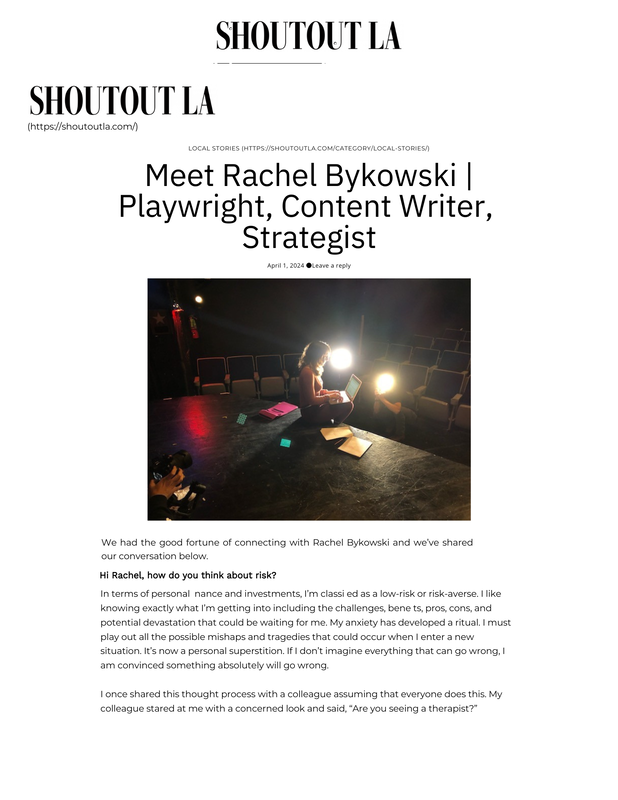
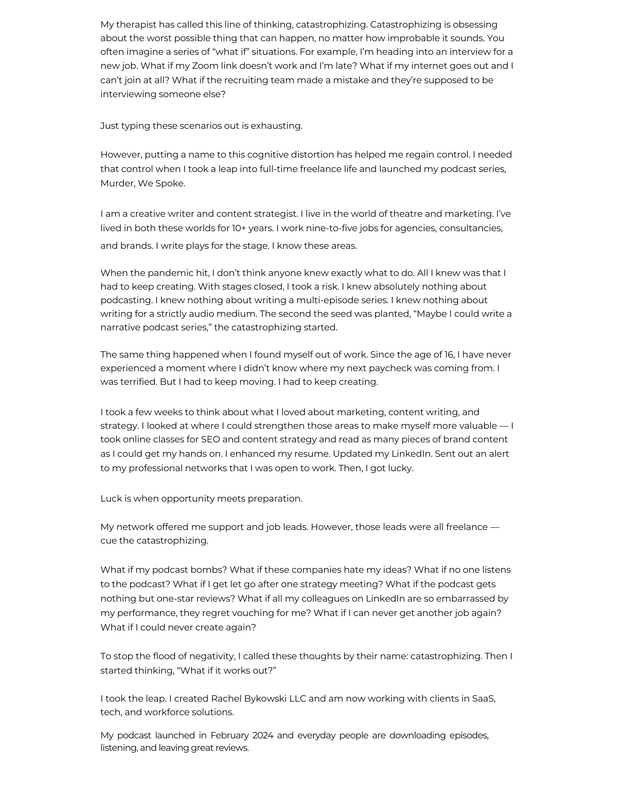
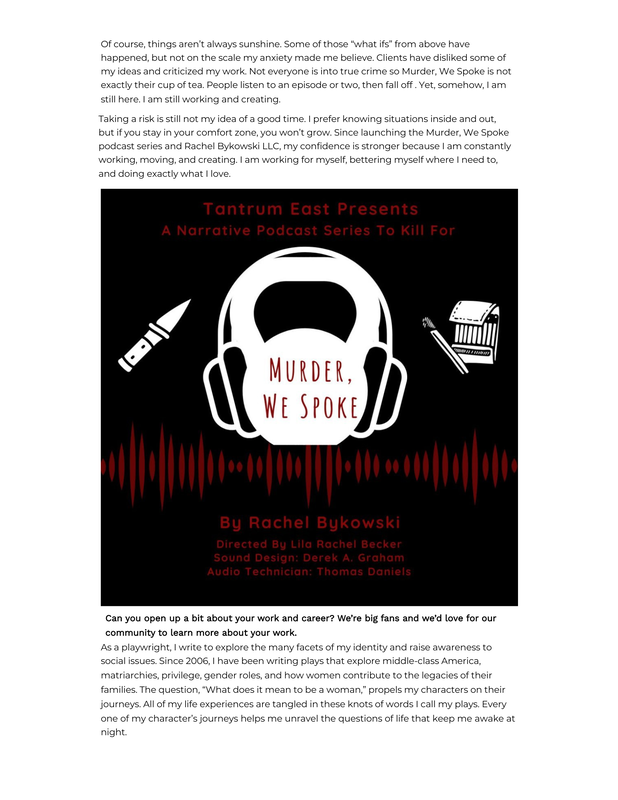
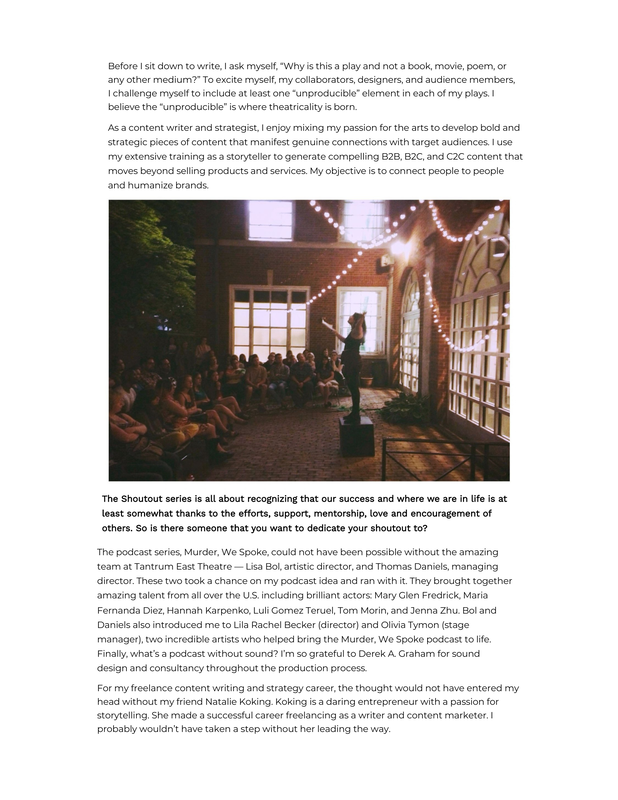
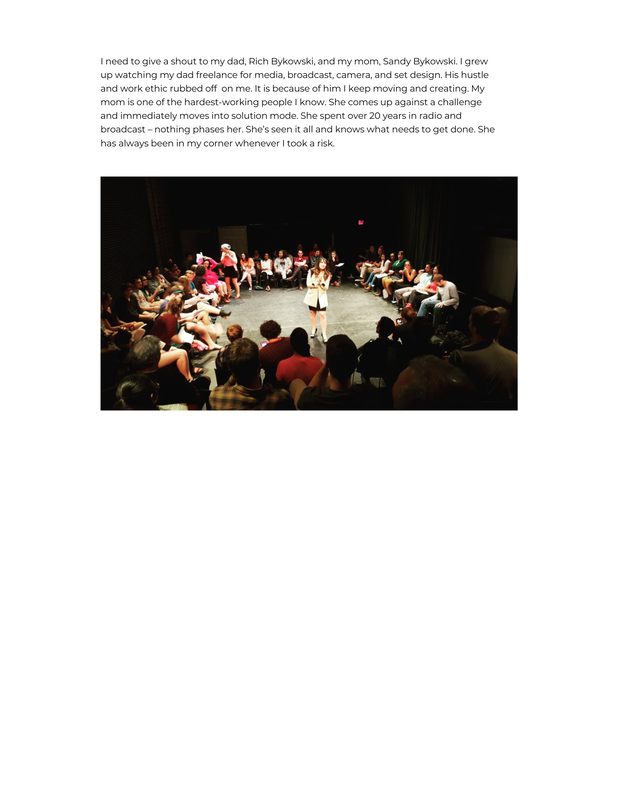
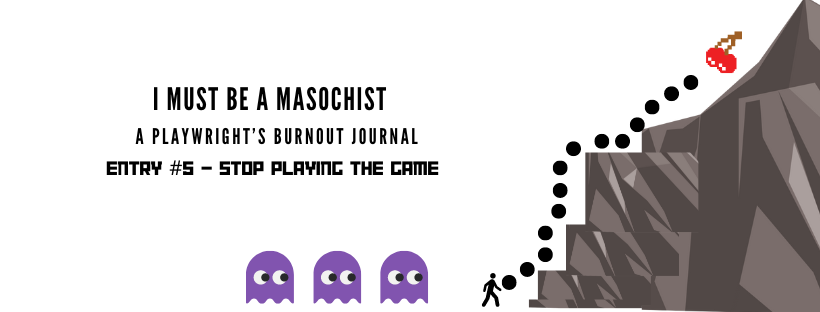


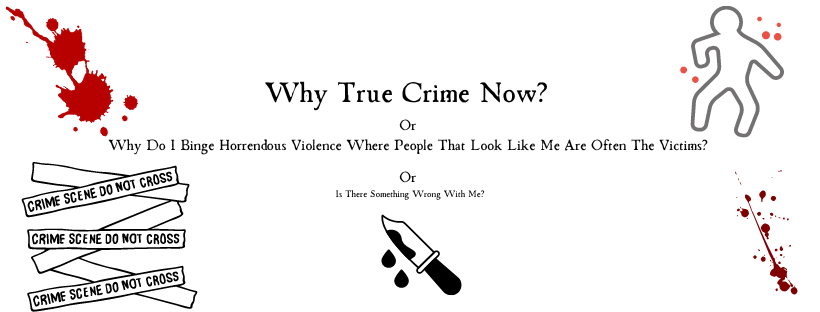
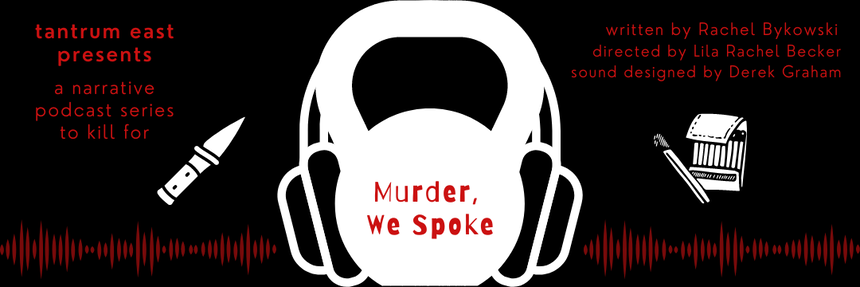

 RSS Feed
RSS Feed